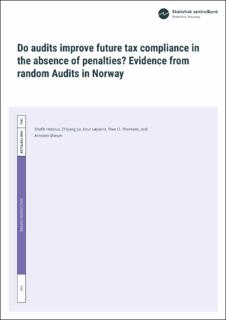Do audits improve future tax compliance in the absence of penalties? Evidence from random Audits in Norway
Working paper
Permanent lenke
https://hdl.handle.net/11250/2726127Utgivelsesdato
2020-11Metadata
Vis full innførselSamlinger
- Discussion Papers [1002]
Sammendrag
The Norwegian Tax Administration operated multi-year random audits of personal income tax returns. We exploit this exceptional randomized setup to estimate the effects of tax audits on future compliance explicitly distinguishing between dynamic responses of compliant and noncompliant audited taxpayers. A priori, the literature has suggested two competing effects: A post-audit deterrence effect—whereby audits prompt taxpayers to comply in subsequent years—or a “bombcrater” effect—whereby audits lower taxpayers’ subjective probability of detecting future evasion and hence weaken compliance. Our results show improved future compliance for five post-audit years by those that were found noncompliant in the audits, despite the absence of penalty, suggesting that it is not the monetary payment per se that carries a deterrence effect. Those that were found compliant, however, show no signs of behavioral adjustments. Although the findings are consistent with the deterrence effect, mainly stemming from being caught of wrongdoing rather than a penalty, we argue that there is also a “learning” effect with the important implication that better information for taxpayers critically complements tax audits.

